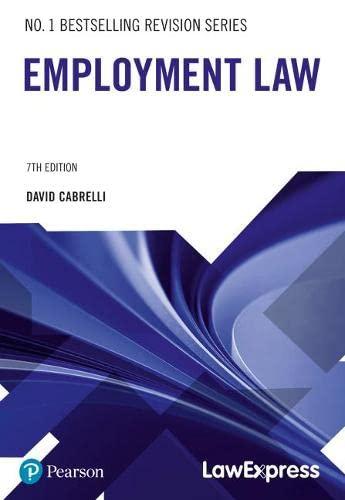Question
True and False Questions: Chapter 20: 1. A contract cannot involve both an implied warranty of merchantability and an implied warranty of fitness for a
True and False Questions:
Chapter 20:
1. A contract cannot involve both an implied warranty of merchantability and an implied warranty of fitness for a particular purpose.
2. A seller's best protection from being held accountable for express statements is not to make them in the first place.
3. A clear, conspicuous, written statement brought to a buyer's attention when a contract is formed can disclaim all warranties not contained in the written contract.
4. To disclaim the implied warranty of merchantability, a merchant must mention "merchantability."
5. Whether or not a buyer examines goods before entering into a contract, there is an implied warranty with respect to defects that an examination would reveal.
6. Privity of contract is required to hold a manufacturer liable in a product liability action based on negligence.
7. In a defense of comparative negligence, an injured party's failure to exercise reasonable care against a known defect will be considered in determining liability.
8. Under the doctrine of strict liability, a defendant is liable for the results of his or her acts only if he or she intended those results.
9. Promises of fact made during the bargaining process are express warranties.
Step by Step Solution
There are 3 Steps involved in it
Step: 1

Get Instant Access to Expert-Tailored Solutions
See step-by-step solutions with expert insights and AI powered tools for academic success
Step: 2

Step: 3

Ace Your Homework with AI
Get the answers you need in no time with our AI-driven, step-by-step assistance
Get Started


